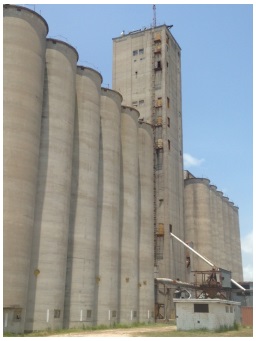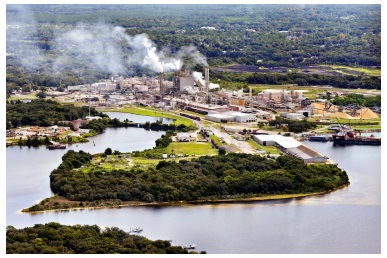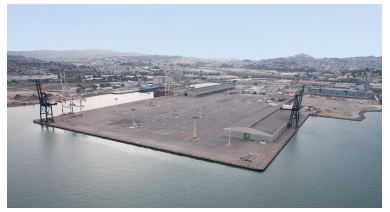Terminal Operations: Brownsville, Panama City, San Francisco
![]() Print this Article | Send to Colleague
Print this Article | Send to Colleague
West Plains LLC has signed an agreement with the Brownsville Navigation District (BND) to modernize and reactivate Port of Brownsville’s long idle grain elevator. The BND Board unanimously approved the lease during its meeting of May 4.
"Farming is part of the DNA of the people of the Rio Grande Valley and many of its residents remember when the port used to move millions of tons of sorghum, corn, and other grain commodities," stated BND Chairman Ralph Cowen. "We worked really hard to make this project become a reality and I am very pleased to have had the full support of the board as well as the support from the port’s staff who worked diligently to achieve this objective."
The lease is structured in three phases – a primary term of 10 years and two 15-year renewal options. Another option allows West Plains to purchase the grain elevator, providing the company meets certain requirements, including job creation thresholds.
"We’re very pleased to be a part of the Brownsville community and the Port of Brownsville," said Paul Johnson, director of operations for West Plains. "The grain elevator is kind of a landmark here at the port. It’s one of the first things you see when you fly into town so we’re very excited to bring it back into production."
West Plains owns and operates 24 grain elevators across four states: Nebraska, South Dakota, Colorado, and Wyoming. The Brownsville grain elevator will be its first in Texas.
Mr. Johnson said the company looks to find new markets for local crops like sorghum and corn. It plans to take full advantage of the port’s strategic location, with direct access to Mexico and other international markets via ocean-going vessels.
"It will take a big undertaking to rehabilitate the facility. There’s a lot of work to be done, but we have a goal set to be able to accept grains this year," Mr. Johnson added.

Photos/Port of Brownsville
Port Panama City (FL) to Double Capacity with 41-Acre Acquisition, Forest Products Terminal Development
Port Panama City (FL) to Double Capacity with 41-Acre Acquisition, Forest Products Terminal Development
Port Panama City on Florida’s Gulf Coast plans to virtually double cargo throughput capacity with the development of a forest products terminal on a newly acquired waterfront tract.
The port authority on May 3 purchased 41 acres of mostly vacant land from WestRock Co. The $13.6 million purchase price was financed through the Florida Department of Transportation (FDOT) State Infrastructure Bank. The deal includes an option to buy 27 more acres for $6 million.
WestRock will continue operating its corrugated packaging mill on adjoining property.
The new forest products terminal will include a 250,000-square-foot warehouse for wood pulp, Kraft linerboard and related goods; a 48-car-capacity rail yard; a refurbished 38-foot-draft berthing area with reinforced bulkhead; and a 10-acre laydown area.
"This is a huge step forward in enhancing Port Panama City’s already-impressive abilities to handle forest product cargos," said Port Executive Director Wayne Stubbs, PPM®. "Exports of paper and wood pellets helped propel Port Panama City to a record year in 2015, with more than 2 million tons of cargo moving across our docks. This acquisition and terminal project position our port to handle sustained growth for many years to come."
With support of $4.25 million in FDOT grant funding, the port is proceeding with $12 million of first-phase forest products terminal projects. An additional $9 million, half from FDOT, is earmarked for bulkhead work and rail and roadway improvements.
A $10 million endeavor, half federally funded, to deepen the channel serving the facility from 32 to 38 feet has won U.S. Army Corps of Engineers approval.
According to the port authority, the new terminal should facilitate creation of nearly 200 direct and indirect jobs and produce an annual economic benefit of more than $125 million."

Site of Port Panama City’s future state-of-the-industry forest products terminal
Photo/Port Panama City
The San Francisco Port Commission on May 10 approved a 15-year marine terminal management agreement with Pasha Automotive Services (PAS) for the port’s Pier 80 cargo terminal. The deal promises to transform this underutilized asset into to a thriving marine terminal, creating new revenue for the port and significant economic and employment benefits for San Francisco.
Pier 80 consists of approximately 60 acres of cargo laydown space, two warehouses, and four deep water berths. In addition to serving as a cargo terminal, it provides the city a facility for emergency preparedness and resiliency in the event of a natural disaster.
For the past year, the port has been in dialogue with PAS about shifting the marketing focus at Pier 80 primarily to automobile imports and exports. PAS is a subsidiary of the Pasha Group, a San Rafael (CA)-based multi-faceted transportation company with shipping services from the U.S. West Coast and Hawaii. PAS currently operates automobile marine terminals in the ports of San Diego and Grays Harbor.
The agreement allows PAS to use of Pier 80 for the import and export of vehicles by ship and on-terminal automobile preparation and detailing services. Vehicles would be transported by truck from Pier 80 to Northern California dealerships. The port anticipates that Pier 80 could receive approximately 96 ship calls and 150,000 vehicles annually. PAS could also manage any project, breakbulk cargo or vessel lay berthing.
The new autos will be imported and exported to and from Asia and Europe as well as Mexico.
The Pier 80 terminal will employ approximately 50 longshoremen during vessel operations. The port and PAS have collaborated with the city’s Office of Economic and Workforce Development (OEWD) to ensure that auto processing job opportunities will be focused on San Francisco residents in the nearby neighborhoods.
As automobile processing reaches capacity, it is anticipated that 150 new employees will be hired and trained.
These jobs, which can be filled by workers with various skill levels, will enhance economic opportunities particularly in San Francisco’s southern neighborhoods. To this end PAS has entered into an agreement with CityBuild, an employment program under the Workforce Development Division of OEWD. CityBuild will work with PAS in providing screened and qualified workforce comprised of skilled San Francisco residents for all phases of work at the Pier 80 operation with a priority for residents in District 10.
The port estimates that an initial throughput of 115,000 autos would yield about 406 total jobs and $3.9 million in annual tax payment to State and local governments.
"This is a winning partnership for San Francisco and Pasha Automotive Services," said Interim Port Director Elaine Forbes. "Pier 80 will again become an active maritime industrial hub while creating hundreds of new blue-collar jobs in the Southeast neighborhoods and generating additional revenue for the port and Pasha."

San Francisco’s Pier 80 is destined to become auto transshipment and processing center under the port’s new terminal management agreement with Pasha Automotive Services.
Photo/Tom Paiva

